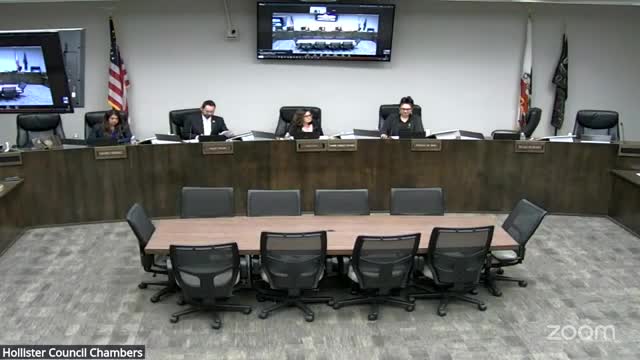Hollister council starts Prop. 218 process on water rates; selects slower five‑year increase (option 2)
Get AI-powered insights, summaries, and transcripts
Subscribe
Summary
Council directed staff to begin the Proposition 218 notice process for the city’s water rate study and chose the more gradual revenue path (alternative 2). The motion passed 3‑1; Council Member Morales dissented. Staff said the plan would raise rates to stabilize the water utility and build reserves after years without an increase.
HOLLISTER, Calif. — The Hollister City Council on Oct. 20 voted to begin the Proposition 218 notice process for a five‑year water rate schedule and selected the more gradual option presented by the city’s rate consultant.
The consultant, Raftelis Financial Consultants’ Steve Gagnon, told the council the utility has not had a rate increase since 2019 and the water enterprise is operating at a structural deficit driven by higher purchased‑water costs, increased groundwater pumping costs, inflation and reduced sales in recent wet years. Gagnon said the study’s two model paths balance revenue and capital needs differently: the steeper plan (alternative 1) produces larger immediate revenue increases and funds more capital work earlier, while alternative 2 phases increases over several years and funds a smaller share of the capital program in the near term.
Under the option the council selected (alternative 2), the city’s modeled revenue increases were roughly 60% in the first year and 40% in the second year, then smaller increases across the remaining years of the five‑year plan; the consultant estimated the average single‑family monthly bill increase under that scenario at about $36.50 per month. Gagnon said the more aggressive option would have produced roughly $54 per month for a typical single‑family customer in the first year.
Public and council comment focused on trade‑offs between rate shock and the city’s need to restore reserves and pay for aging infrastructure. Council Member Morales said she favored the larger, faster increase to get the fund healthy sooner; other council members preferred the gradual approach because of current economic pressures on households.
After discussion Council Member Ellis moved — and the council seconded — a motion directing staff to proceed with alternative 2 and to begin the Prop. 218 noticing process. The motion passed on roll call: Vice Mayor Pache voted yes, Council Member Morales voted no, Council Member Deanda voted yes, and Mayor Stevens voted yes. The council recorded the motion as passing 3‑1, with Council Member Morales dissenting.
What happens next: staff and the city attorney will mail Prop. 218 notices to property owners and begin a 45‑day protest period ahead of the public hearing required to adopt new rates. The consultant and staff said the notice and protest period are prescribed by law; if the council ultimately adopts rates following the hearing, new rates would take effect on the schedule the council adopts.
Council and staff also discussed low‑income impacts. Staff pointed to 2‑1‑1 and other local social‑service resources as directories for assistance and said the city will include outreach and informational materials in the Prop. 218 mailings to explain the options and why increases are proposed. The consultant and staff noted the option chosen preserves a measurable pathway to rebuild reserves aimed at reducing future emergency borrowing and covering capital replacement for older pipes and valves.
Why it matters: the vote authorizes staff to start the legally required public‑notice and protest process; the city’s water fund will rely on higher user rates for several years to close an operating gap and build capital reserves.
